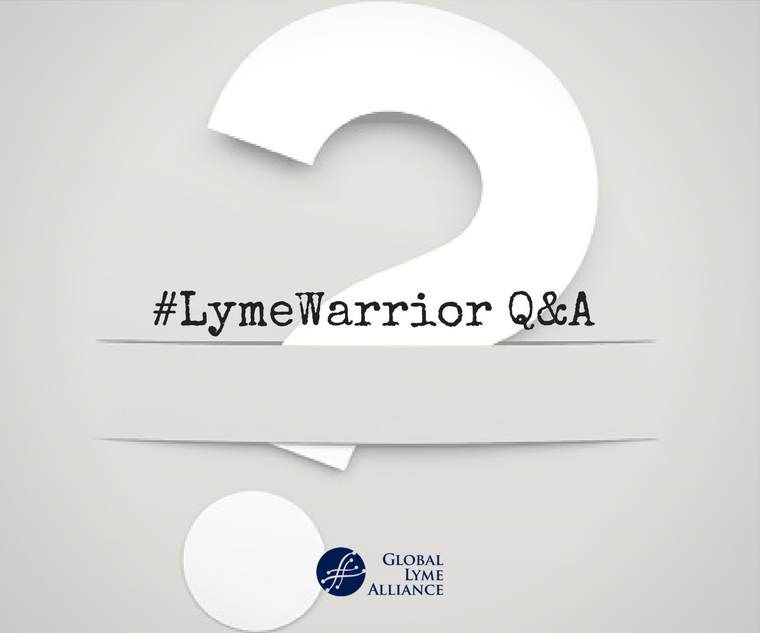
Every few months, Jennifer Crystal devotes a column to answering your questions. Do you have a question for Jennifer? If so, email her at lymewarriorjennifercrystal@gmail.com.
Have you had long term problems with babesiosis after treatment?
As I note in my blog post “Have You Heard of the Tick-Borne Disease Babesiosis?” babesiosis can be a relapsing disease. It is the tick-borne infection I have continued to struggle with the most in my 20+ year health journey. I got over ehrlichiosis completely. Besides one major relapse, my Lyme disease has only had minor flare-ups from time to time. But my babesiosis has tended to creep up on me every six months or so, or during periods of high stress. I can tell when this is happening because I start to experience air hunger after exertion (sometimes just from walking up a flight of stairs), nightsweats, low blood sugar reactions, and lightheadedness. Before the symptoms get too severe, I do a short course of anti-malarial medication to nip them in the bud. In between these periods, I use homeopathic drops to keep the symptoms at bay as long as possible.
This protocol has worked well for me, but there is no set protocol for treating tick-borne diseases. What worked for me might not work for you; only your LLMD can determine the best way to manage your recurrent babesiosis. Though many patients have written to ask which anti-malarial medication and homeopathic drops I’ve tried, it unfortunately doesn’t help for me to give out my ever-changing protocol. I can tell you that my own babesiosis symptoms have decreased over time, and that the periods between treatment courses have stretched longer and longer. So while babesiosis can cause long-term problems, they can improve over time.
When you experience air hunger, do you have objective signs like low oxygen saturation? Do you find yourself breathing more quickly? Is air hunger in any way related to the larynx spasming or unable to relax because of babesiosis?
My pulse ox rate, or level of oxygen in my blood, is normal when I experience air hunger. Unlike the shortness of breath I sometimes experience with long-haul COVID-19, my babesiosis air hunger does not affect my breathing; it affects oxygenation throughout the rest of my body (for more on the difference between the two, please see my post “Differentiating Between Babesia and COVID-19 Air Hunger”).
Normal oxygen saturation levels don’t mean you aren’t experiencing very real babesiosis symptoms. With tick-borne illness and COVID-19 alike, sometimes the symptoms patients experience don’t match the lab work. We simply may not yet have adequate objective measures to support subjective symptoms, but that doesn’t mean they aren’t there. Despite normal saturation levels throughout my acute COVID-19 infection, I experienced shortness of breath. Many long-haul COVID-19 patients, myself included, have normal cardiac and pulmonary workups, even though they have serious respiratory symptoms. Similarly, many people test negative for Lyme disease when they actually have it (see Lyme Disease Testing). This is why it’s so important for a Lyme Literate Medical Doctor (LLMD) to evaluate your clinical symptoms.
Though my oxygen saturation has been normal, other biomarkers have been off when I experience air hunger. For example, my ferritin levels tend to drop when I am having a babesiosis flare, and they dropped when I had COVID-19. Talk with your LLMD to see if there are other biomarkers they want to watch that could be impacted by your infections.
You can also ask your LLMD if babesiosis is related to your larynx spasming. Singer Shania Twain experienced larynx issues due to the neurological effects of Lyme disease. She discusses how nerve damage affected her vocal cords in her documentary Not Just a Girl.
Do you think I have Lyme disease? Can you look at my lab work?
While I do have years of personal experience with tick-borne illness and am well-versed in the scientific research, I am not a medical doctor and cannot provide medical advice. Many patients write to me to ask if their symptoms mean they have Lyme disease. I can certainly tell you if your symptoms sound like they could point to Lyme, but I cannot make a diagnosis or evaluate your blood work; only a medical doctor can do that. Similarly, only your LLMD can determine the best protocol for your personal case of tick-borne illness. I wish I had the magic answer, and maybe someday there will be one. Until that time, though, please know that I support you as a fellow patient. I hope my story can provide insight and inspiration, and help you feel less alone on your journey.
To read more blogs, click here.
The above material is provided for information purposes only. The material (a) is not nor should be considered, or used as a substitute for, medical advice, diagnosis, or treatment, nor (b) does it necessarily represent endorsement by or an official position of Global Lyme Alliance, Inc. or any of its directors, officers, advisors or volunteers. Advice on the testing, treatment or care of an individual patient should be obtained through consultation with a physician who has examined that patient or is familiar with that patient’s medical history.

Jennifer Crystal
Writer
Opinions expressed by contributors are their own. Jennifer Crystal is a writer and educator in Boston. Her work has appeared in local and national publications including Harvard Health Publishing and The Boston Globe. As a GLA columnist for over six years, her work on GLA.org has received mention in publications such as The New Yorker, weatherchannel.com, CQ Researcher, and ProHealth.com. Jennifer is a patient advocate who has dealt with chronic illness, including Lyme and other tick-borne infections. Her memoir, One Tick Stopped the Clock, was published by Legacy Book Press in 2024. Ten percent of proceeds from the book will go to Global Lyme Alliance. Contact her via email below.